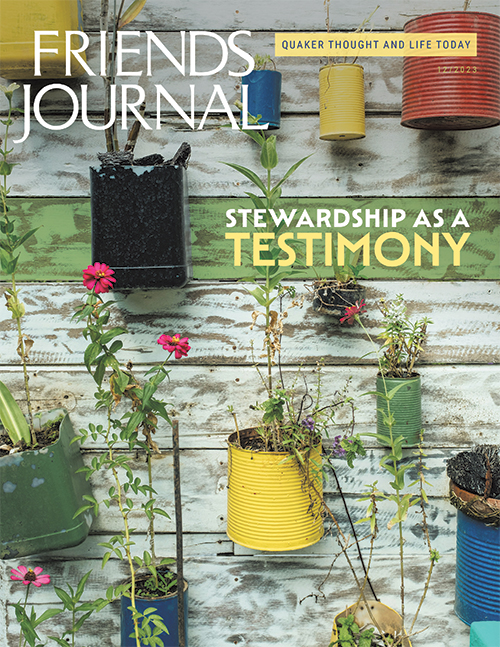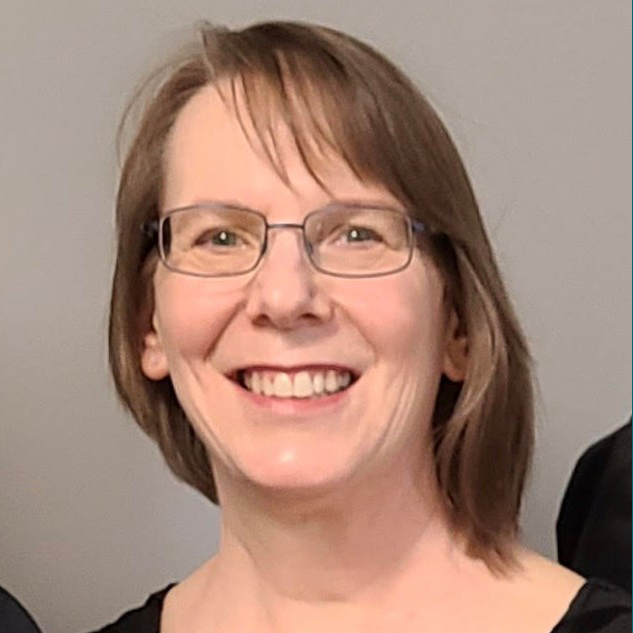A Quaker Approach to Charity
I love the Quaker thinking that blends all the testimonies. It’s hard to think of any single testimony without considering how it relates to the others. Stewardship is the perfect example: being a good steward, whether of the earth or of your own resources, requires integrity in how you act, simple living to free up funds for charitable giving, and a belief in the equality of all persons. It’s taken me a long time, though, to figure that out.
During my 25-year-plus membership in a Canadian Protestant church, stewardship was a common topic in sermons. Stewardship in this sense was always about money, so that’s what I’d like to address here. It was usually brought up at least twice a year: once at the beginning of the fiscal year for members to plan their budgets (preferably with an increase in their automatic monthly contributions) and again mid-year to point out how far behind donations were to expenses. Popular Bible verses pulled out for these sermons included Acts 20:35 (NIV):
In everything I did, I showed you that by this kind of hard work we must help the weak, remembering the words the Lord Jesus himself said: “It is more blessed to give than to receive.”
I quite liked this one. There was also 2 Corinthians 9:7–8:
Each of you should give what you have decided in your heart to give, not reluctantly or under compulsion, for God loves a cheerful giver. And God is able to bless you abundantly, so that in all things at all times, having all that you need, you will abound in every good work.
I didn’t like this one as much; the first half is fine, but the second half feels like a quid pro quo: that I should give in order to receive.
Occasionally, I would even hear Matthew 19:21:
Jesus answered, “If you want to be perfect, go, sell your possessions and give to the poor, and you will have treasure in heaven. Then come, follow me.”
I couldn’t hop on this particular bandwagon at all. In order to be good to the poor, I had to make myself one of them? I will settle for being less than perfect.
At some point, a church member would get up and talk about why they tithed and about how much better we all would feel if we tithed, too. I did not tithe. My husband, an SBNR (spiritual but not religious) Christian, has an equal say in how we spend our money, and church wasn’t high on his list. I compensated—in my mind, at least—by volunteering on boards, committees, special projects, and outreach programs. At one point, we did give a substantial amount to a capital campaign to restore the church’s historic building; as the capital campaign co-chair, I felt it was only right, and my husband felt strongly about community and that this was a good cause for the whole town.

For many years we donated to charities, like church, on the automatic model, choosing an appropriate amount to give monthly to causes global, national, and in our community. As a busy, working couple raising children, we chose any means possible to automate payments to keep things simple, so every month $25 would go here; $50 would go there; $100 would go somewhere else, and so on. Easy. No thinking required, and therein lay the problem.
One day, I read one of the newsletters sent out quarterly by one of our chosen local charities and discovered that they had, for some years, been supporting a cause that was completely against our values, but we hadn’t realized it because we were too busy to do more than glance over the newsletters before tossing them in the recycling bin. I brought the newsletter to my husband, and it didn’t take us long to decide that we wanted to drop that charity in favor of one more aligned with our principles, but again, we were busy. It was months before we did anything about it. Think about that: we were knowingly giving money to a cause we strongly opposed.
Something similar happened a few years later. I belonged to a charitable-giving club, where four times a year a bunch of people got together to vote on a charity to support, and then everyone in the club would write the selected nonprofit a check; in this way, that one organization would get a large donation for a special project. I, as a member, only had to invest $100 and one hour every quarter, a welcome proposition in a busy life. Again, though, I eventually found that just because a group has charitable status doesn’t make it something I’m willing to financially support. I wrote my last check and quit the club.
I was in a conundrum. I wanted to be a good steward with my money and share it with those less fortunate or with organizations doing worthwhile work, but there are so many options and handing out a few dollars here and there didn’t feel like I was abounding in any kind of good deed. Then there were the other demands: we are at an age when friends are either having major birthdays or dying, and contributions to their favorite charities in tribute were blowing our budget, the very opposite of good stewardship.
Our time-saving automatic payments—while helpful to charities that count on money coming in regularly—had taken all the integrity out of our giving, and it was time to put it back in.
It was right around this time that I started attending Quaker meeting. Rather than being preached to about stewardship, I was encouraged to dig deeper into myself to discover what stewardship means to me. The key turned out to be that interconnectedness among the testimonies. In Britain Yearly Meeting’s Advices and Queries, I read, “Do you maintain strict integrity in . . . your dealings with . . . organizations? Do you use money and information entrusted to you with discretion and responsibility?” Integrity and stewardship go hand-in-hand, and integrity requires careful deliberation and thought, which in turn require time. Our time-saving automatic payments—while helpful to charities who count on money coming in regularly—had taken all the integrity out of our giving, and it was time to put it back in. I had thought those pre-approved withdrawals every month were the essence of simplicity, but I was wrong. The simplest solution, in my view, was to coalesce all those small donations into one larger one.
Conversations with my husband ensued. We agreed that we needed to change—not what we give but how we give. We wanted to give with intention, knowing that our donations would be directed appropriately. We started researching exactly what each organization wanted to accomplish, and also how they were doing it: like how much of their resources were being taken up in administrative costs and mail-outs.
We had our names taken off mailing lists, and we stopped those automatic monthly donations. Now we allocate a lump sum each month from our family budget to a cause we can both agree on. If there are memorial or tribute gifts to be made, they come out of that, or if one of us wants to donate to something separately, we do it out of our personal allowance. Once a month, on payday, we sit down together to pay our bills, and when that’s done, we get to choose which charity will get that month’s donation. It’s become something to look forward to, something that turns a chore—bill-paying—into a pleasure. It’s truly turned us into “cheerful givers.”





Excellent points, Judith Appleby! There are organisations to which I shall continue to donate automatically (our Meeting, Canadian Friends Service Committee, to name two), those that I’ll discontinue, and those that I’ll spend time discerning before giving or not giving. Being a cheerful giver is a goal to embrace wholeheartedly! Thank you, Friend!
In addition to moral and efficient use of funds, good giving should also consider a non-profit’s top salary per the IRS 990, as some are immorally high. To stretch donations dollars, matching funds (or partial reimbursements) can get other donors involved. Dependents (children, disabled, seniors) are usually the greatest need, but in US most have basic needs funded, so now opt to fund greatest under-met needs. Taking advantage of tax deductions can also allow more donations, particularly HSA’s, 529 deductions in some states, and capital gains (taxed at 0%) when combined with lower incomes and itemized charitable giving. Long-term, endowments ensure the principle is preserved, so only interest is spent, although some should be reinvested to offset fees, inflation, and market losses, as well as keep growing the principle to keep growing charitable capacity to help the greatest under-met needs. Now exploring giving to create entrepreneurial non-profits to fill the greatest under-met needs not locally addressed. For example, creating Bible colleges in Africa to train student to share Good News in rural areas if not qualified for seminary due to conflicts disrupting education. The best giving is usually not easy to discern, but deeply satisfying.
Would currently love to figure out how US nurses could volunteer online preventative and basic tele-health to global poor with internet access using a cell phone, who post a description of concern. Then qualified US (or EU or anywhere) volunteer nurses log in for as few or as many hours as desired to identify cases within skill set to help and contact with advice. Existing social media might already be able to facilitate communications (chat, email, phone). Alternatively, a religious hospital with web developers could tailor software and organize the entire system. Nurses might even be able to help train local trainers of nurses to share medical knowledge far wider and far faster. There is a non-profit doing an expensive program for impressive MD tele-health, but currently only serving one location per nation due to tech costs. Know anyone who could help on the tech side to facilitate low cost volunteer nurse global communications?
I love your call for intentionality, integrity and accountability. I would, though, like to put in a plug for automatic monthly donations (with proper due diligence). As a career non-profit fundraiser and executive, I know the deep value of a steady income stream to sustain programs, pay staff, keep the lights on. Constantly having to invent and reimagine programs so that they are shiny and attractive to new donors is exhausting and can comprimise the core programs that truly accomplish the mission. By all means, research the organization for mission fit, find out how we pay and treat our employees (how much we pay front-line workers, not just the eewxecutive), what true impact our work has, etc. The if it’s the right fit, and if we’ve earned your trust, the best support you can provide is that steady monthly contribution (with the occasional bonus chunk thrown in, of course!) And please do continue to read our newsletters and annual reports, engage with the organization, hold us to account, enter into relationship with our people and our work. Automatic donations do not have to mean lack of engagement.
A great call to integrity and charity. Feel blessed with the writing.